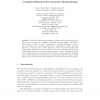Free Online Productivity Tools
i2Speak
i2Symbol
i2OCR
iTex2Img
iWeb2Print
iWeb2Shot
i2Type
iPdf2Split
iPdf2Merge
i2Bopomofo
i2Arabic
i2Style
i2Image
i2PDF
iLatex2Rtf
Sci2ools
LCPC
2007
Springer
2007
Springer
Compiler-Enhanced Incremental Checkpointing
As modern supercomputing systems reach the peta-flop performance range, they grow in both size and complexity. This makes them increasingly vulnerable to failures from a variety of causes. Checkpointing is a popular technique for tolerating such failures in that it allows applications to periodically save their state and restart the computation after a failure. Although a variety of automated system-level checkpointing solutions are currently available to HPC users, manual application-level checkpointing remains by far the most popular approach because of its superior performance. This paper focuses on improving the performance of automated checkpointing via a compiler analysis for incremental checkpointing. This analysis is shown to significantly reduce checkpoint sizes (upto 78%) and to enable asynchronous checkpointing.
Distributed And Parallel Computing | LCPC 2007 | Manual Application-level Checkpointing | Modern Supercomputing Systems | Peta-flop Performance Range |
Related Content
| Added | 08 Jun 2010 |
| Updated | 08 Jun 2010 |
| Type | Conference |
| Year | 2007 |
| Where | LCPC |
| Authors | Greg Bronevetsky, Daniel Marques, Keshav Pingali, Radu Rugina |
Comments (0)

